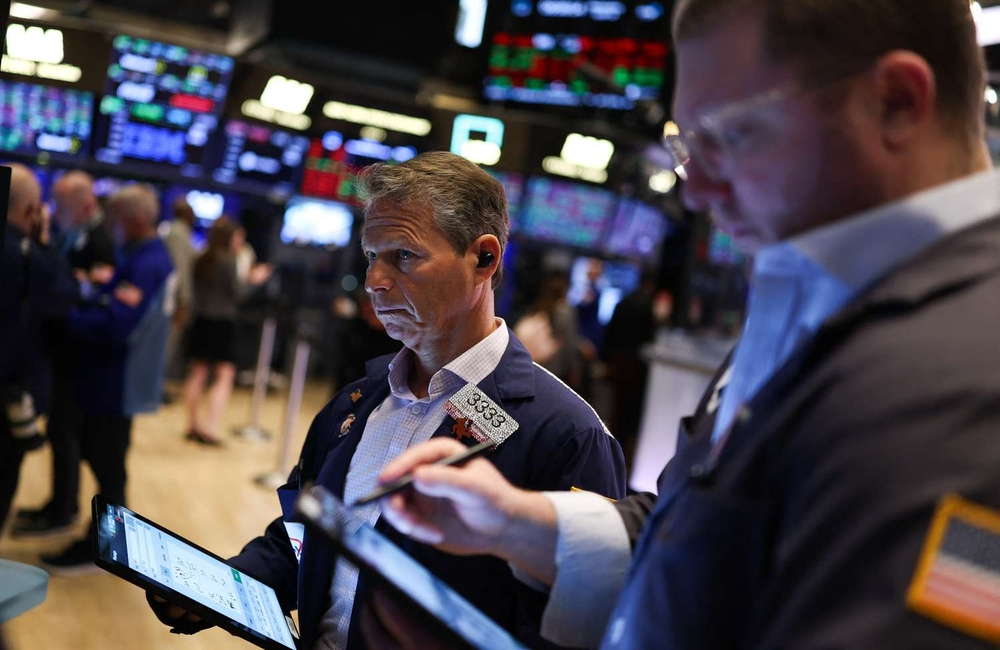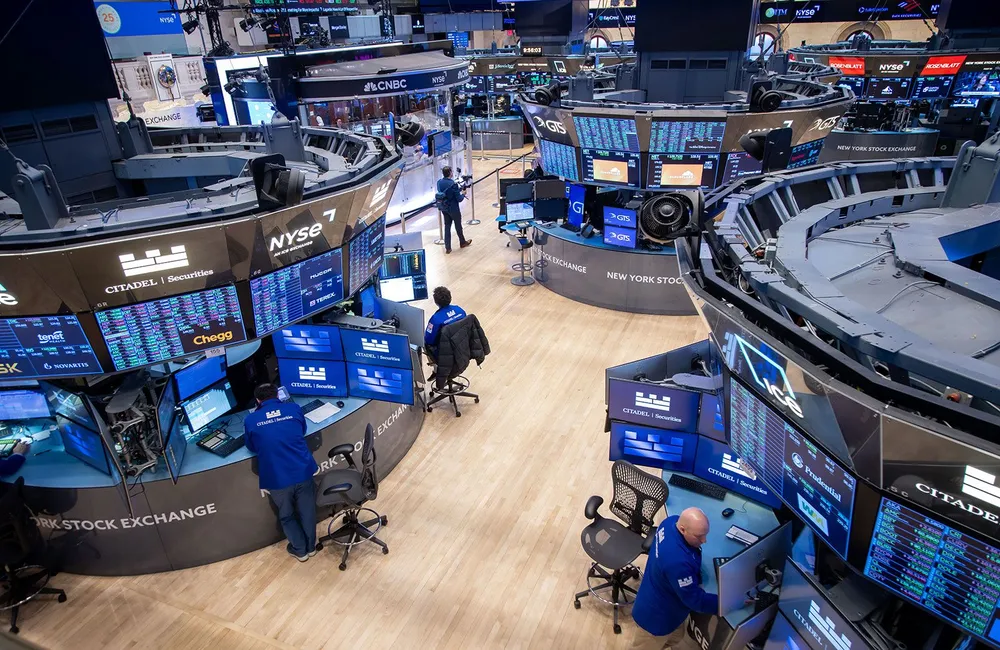Futures for the S&P/ASX 200 index rose 31 points, or 0.4 percent, to 7303 at 8:00 am on Thursday, indicating some positivity in trading as it had been lower a few hours earlier.
The Dow Jones Industrial Average closed up 2.8%, its best one-day performance since November 2020. The S&P 500 soared 3% for its biggest one-day gain since May 2020, and the Nasdaq Composite gained 3.2%. All three indexes had been lower earlier in the day.
Major indexes were little changed on Wednesday before the Fed’s decision, which came after the central bank said it would raise interest rates by half a percentage point and begin shrinking its $9 trillion asset portfolio next month. Both decisions had been widely anticipated by investors ahead of the conclusion of the central bank’s policy meeting.
What surprised some was Mr. Powell saying that the Fed was not “actively considering” raising interest rates by 0.75 percentage point at a future meeting. Federal-funds futures, a tool traders use to gauge interest-rate expectations, had long shown the market was pricing in a 95% chance the Fed would take such a step in June.
“There’s a sense of relief,” said Christopher Smart, chief global strategist and head of the Barings Investment Institute.
At the local close, the S&P/ASX 200 was off 0.2% to 7304.7 in a third straight decline led by weakness in the real-estate, tech and consumer sectors.
It started the day stronger, after US equities led higher overnight, but faded through the session as traders sold shares of companies that are negatively exposed to Tuesday’s surprise rise in Australian interest rates, which was larger than expected.
Real estate was once again the least performing sector, down 1.5%.
EML Payments, Block and Tyro lost 3.5% to 5.8% each as the tech sector shed 1.0% while Computershare rose 1.8% after Macquarie analysts flagged higher rates as a potential boon to its margin income.
Energy companies were the biggest gainers, climbing 0.8 per cent as natural gas prices reached their highest since September 2008. Santos was up 1.1% and Viva Energy Group gained 1.8%, while Woodside fell 0.1%.
Prices were driven higher by the prospect of further European Union sanctions on Russian gas and by Moscow’s shutting down shipments to Poland and Bulgaria last week.
Financials gained 0.7%, with all four major banks higher after raising their variable rate loans following Tuesday’s increase in the cash rate.
On commodity markets, gold futures dipped 0.1 percent to $US 1868.80 a barrel; brent climbed 4.9% to $US110.1.9% to US$13 a barrel after the European Union unveiled plans to prohibit Russian oil imports; iron ore advanced 0.4% to US$142.90 a tonne.
Australian bonds were also dipping further as investors adjusted to the Reserve Bank’s larger-than-expected Tuesday rate hike. The yield on the Australian 2 Year government bond rose to 2.85% with the 10 Year soaring to 3.54%. US bonds rallied, with US Treasury 2 Years yields falling to 2.64%, 10 Year yields softening to 2.93%
The Australian dollar surged, buying 72.49 US cents at 7:00 am AEST, compared with its last close on 70.94. The Wall Street Journal Dollar Index, which tracks the US dollar against 16 other currencies, declined to 94.83.
Asia
Mainland Chinese share markets were shut for the Labor Day holidays.
Hong Kong stocks fell as they ended the session, continuing a muted trading momentum throughout the week, with mainland markets closed for holidays. The benchmark Hang Seng Index slipped 1.1% ending the day at 20869.52. Technology stocks fell heavily, led by Chinese giants, which have declined sharply from a late-week surge, when policy signals turned more conducive to that sector. The bounce momentum evaporated Tuesday, and the sector extended losses further today. Alibaba Health dropped 7.5 percent, Meituan lost 4.6 percent and JD. com was down by 4.1%.
Japanese share markets were closed for a public holiday.
Europe
European stocks closed down as investors adopted a wait-and-see approach ahead of a policy decision from the Federal Reserve later Wednesday and a proposal by the EU to ban all oil imports from Russia by the end of the year.
The pan-European Stoxx Europe 600 fell 1.1 percent, while the German DAX dropped 0.5 percent and the French CAC 40 slumped 1.2 percent. The FTSE in London finished 0.9 percent lower.
“The Fed’s hike may be broadly priced in, but clearly the markets are nervous that a more hawkish FOMC could spark an explosion of volatility which sends indices back beneath last week’s lows,” IG analyst Chris Beauchamp writes in a note.
North America
US stocks soared, notching their largest one-day gain since 2020, after the Federal Reserve chairman, Jerome Powell, laid to rest investors’ concerns that the central bank may be weighing larger interest-rate increases in the coming months.
The major indexes were little changed Wednesday at first after the Fed, as expected, said Thursday it would raise interest rates by half a percentage point and start shrinking its $9 trillion asset portfolio next month. Financial markets had universally anticipated both decisions heading into the end of the central bank’s policy meeting.
What surprised some was Mr. Powell saying the Fed was not “actively considering” raising interest rates by 0.75 percentage point at a future meeting. Traders of federal-funds futures use the contracts to bear on interest-rate views, and before Tuesday they had priced the market at a 95% unconditional chance the Fed would make such a move in June.
Stocks surged after Mr. Powell’s comments, with the Dow Jones Industrial Average closing 2.8 percent higher, its largest one-day increase since November 2020. The S&P 500 surged 3 percent for its best day since May 2020, and the Nasdaq Composite rose 3.2 percent.
All three indexes were down earlier in the day.
“There is a sense of relief,” said Christopher Smart, chief global strategist and head of the Barings Investment Institute.
With stocks and bonds teetering in recent weeks, many investors had been concerned that the speed of the Fed’s withdrawals of monetary support would shake markets up. Others have started to wrestle with that concern that the central bank, which is increasing rates quickly in a bid to squelch inflation, could accidentally send the economy tumbling into recession. But the Fed’s signaling did allay investor anxiety, Mr. Smart said.
“There’s a sense that they’re moving in the right direction,” he said. The central bank, he said, has made it clear that it is serious about fighting inflation but is not giving the impression that it intends to surprise investors in the magnitude of its future rate hikes.
Stocks rallied across the board, with all 11 sectors of the S&P 500 closing in the green.
Exxon Mobil and Chevron each gained more than 3 percent, helped by a surge in oil prices. Technology and consumer-discretionary shares, once among the market’s biggest decliners earlier Wednesday, soared. The group had already taken a beating earlier in the year, as investors grappling with rising interest rates turned away from high-valuation companies. It had staged a rebound alongside bond prices, however, after Mr. Powell’s remarks. Shares of Alphabet and Facebook parent Meta Platforms gained over 4% each.
Corporate earnings were another source of volatility in the market Wednesday. Shares of Airbnb rose $11.18, or 7.7%, to $156.18 after the company said it expects to report its first full-year net profit this year. Starbucks rose $7.31, or 9.8 percent, to $81.64 after the coffee chain said profits and sales increased during the most recent quarter.
Treasury prices also climbed as stocks rose.
The bond market had been succumbing to its worst rout in decades as investors wrestled with accelerating inflation and the prospect of a swift increase in interest rates by the Fed. The rapid jump in bond yields added to the chaos that has engulfed the stock market throughout the year.
But Mr. Powell’s comments seemed to alleviate the selling pressure on Treasurys Wednesday. The yield on the benchmark 10-year Treasury note held steady at 2.93%, versus 2.957% Tuesday. Bond yields rise when prices fall, and vice versa.
The yield on the two-year Treasury note, which is particularly sensitive to changes to the outlook for monetary policy, also declined. It finished at 2.64%, compared with 2.768% Tuesday.
Other officials earlier Wednesday expressed confidence in the economic picture. The US economy is strong even as it contracted in the first quarter of this year, Treasury Secretary Janet Yellen said at The Wall Street Journal’s CEO Council Summit in London.




















